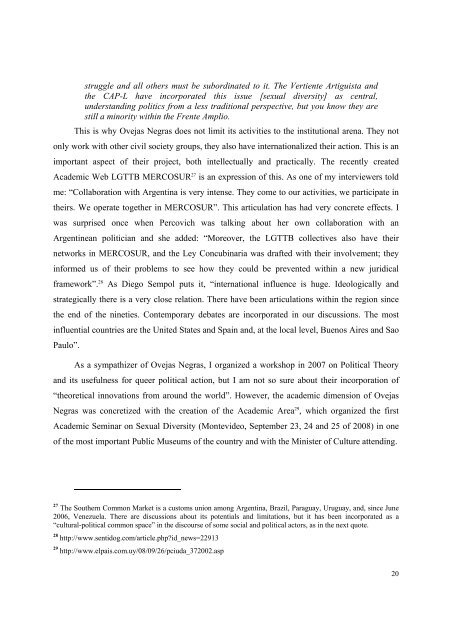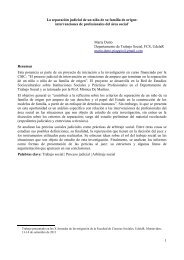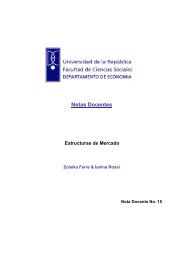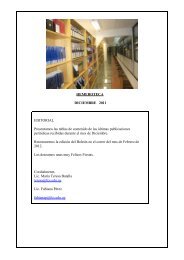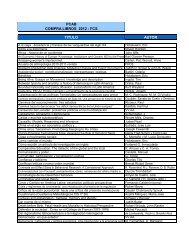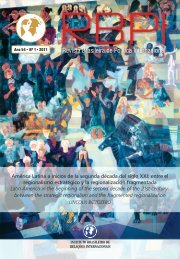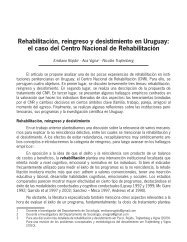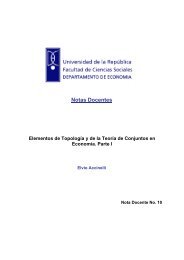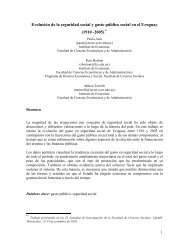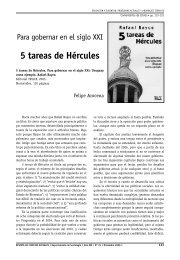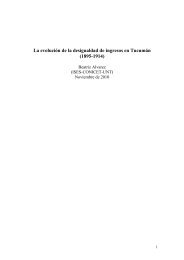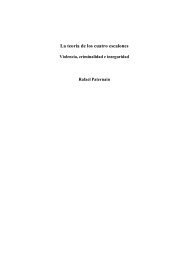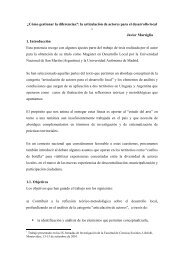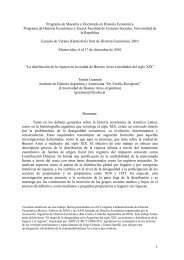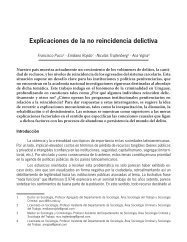Paulo Ravecca - Facultad de Ciencias Sociales
Paulo Ravecca - Facultad de Ciencias Sociales
Paulo Ravecca - Facultad de Ciencias Sociales
You also want an ePaper? Increase the reach of your titles
YUMPU automatically turns print PDFs into web optimized ePapers that Google loves.
struggle and all others must be subordinated to it. The Vertiente Artiguista and<br />
the CAP-L have incorporated this issue [sexual diversity] as central,<br />
un<strong>de</strong>rstanding politics from a less traditional perspective, but you know they are<br />
still a minority within the Frente Amplio.<br />
This is why Ovejas Negras does not limit its activities to the institutional arena. They not<br />
only work with other civil society groups, they also have internationalized their action. This is an<br />
important aspect of their project, both intellectually and practically. The recently created<br />
Aca<strong>de</strong>mic Web LGTTB MERCOSUR27 is an expression of this. As one of my interviewers told<br />
me: “Collaboration with Argentina is very intense. They come to our activities, we participate in<br />
theirs. We operate together in MERCOSUR”. This articulation has had very concrete effects. I<br />
was surprised once when Percovich was talking about her own collaboration with an<br />
Argentinean politician and she ad<strong>de</strong>d: “Moreover, the LGTTB collectives also have their<br />
networks in MERCOSUR, and the Ley Concubinaria was drafted with their involvement; they<br />
informed us of their problems to see how they could be prevented within a new juridical<br />
framework”. 28 As Diego Sempol puts it, “international influence is huge. I<strong>de</strong>ologically and<br />
strategically there is a very close relation. There have been articulations within the region since<br />
the end of the nineties. Contemporary <strong>de</strong>bates are incorporated in our discussions. The most<br />
influential countries are the United States and Spain and, at the local level, Buenos Aires and Sao<br />
<strong>Paulo</strong>”.<br />
As a sympathizer of Ovejas Negras, I organized a workshop in 2007 on Political Theory<br />
and its usefulness for queer political action, but I am not so sure about their incorporation of<br />
“theoretical innovations from around the world”. However, the aca<strong>de</strong>mic dimension of Ovejas<br />
Negras was concretized with the creation of the Aca<strong>de</strong>mic Area29 , which organized the first<br />
Aca<strong>de</strong>mic Seminar on Sexual Diversity (Montevi<strong>de</strong>o, September 23, 24 and 25 of 2008) in one<br />
of the most important Public Museums of the country and with the Minister of Culture attending.<br />
27 The Southern Common Market is a customs union among Argentina, Brazil, Paraguay, Uruguay, and, since June<br />
2006, Venezuela. There are discussions about its potentials and limitations, but it has been incorporated as a<br />
“cultural-political common space” in the discourse of some social and political actors, as in the next quote.<br />
28 http://www.sentidog.com/article.php?id_news=22913<br />
29 http://www.elpais.com.uy/08/09/26/pciuda_372002.asp<br />
20


